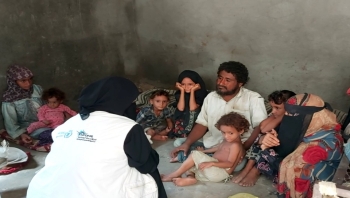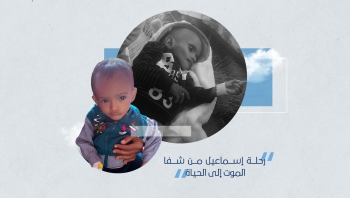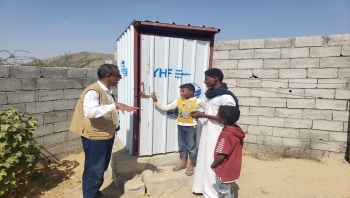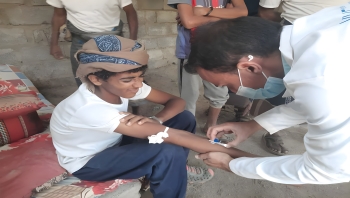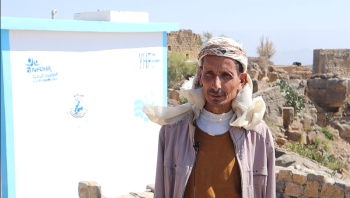Al-Shaheed Al-Awadi Hospital in Radman serves more than 27,000 people in the Radman district, and many residents from the neighboring districts of Ash Sharyah, Al-Sawadiya and Mukayras, but because of the economic situation and the interruption of salaries, the Hospital was forced to stop providing services in March 2017.
Ahmed Ali al-Awadi, the Director of the hospital explains, "We used to have a medical team that provided primary healthcare, radiation, dental, laboratory and other services, but because of the war and lack of salaries, we gradually stopped providing such services until we had no more staff. Our last doctor left early last March.”
After three months of being closed down, the National Foundation for Development and Humanitarian Response (NFDHR) intervened through cholera activities in the Radman district, as part of its plan to eradicate the cholera epidemic in Al-Bayda.
NFDRH has been working to rehabilitate the hospital, by providing it with furniture, essential equipment and medicines, and even helped opened a treatment center for acute water diarrhea (AWD/ Cholera) as part of the project's integrated activities in the emergency response to the cholera epidemic. It also provided medical staff and health workers monthly incentives as a salary alternative.
In June 2017, Al-Shaheed Al-Awadi Hospital finally resumed its activities and has been open 24 hours a day to receive patients with severe acute water diarrhea and other medical needs.
The reopening of the hospital was met with great satisfaction by local authorities and community leaders in the directorate. The hospital has also been witnessing an increasing number of patients wishing to receive free medical services, not only for treating AWD/ Cholera, but also for internal medicine, child health care and other primary care services.
Ahmed Al Awadi, the director of the hospital, said that NFDHR’s intervention and direct contribution to the re-opening and operation of the hospital has had a positive impact on the provision of primary health care services for its catchment population, which is over 27,000.
Also, Al-Awadhi added, "We are grateful that the National Foundation for Development and Humanitarian Response helped us to operate the hospital and rehabilitate our AWD/Cholera department to treat acute water diarrhea. We are also grateful that they provided medical staff and medicines, so that we can receive between 40-50 cases daily for Integrated health. "
He praised the Foundation and its efforts in combating the cholera epidemic in the Radman district, and for their role in fighting against acute water diarrhea (AWD/ Cholera). The epidemic could have been exacerbated and difficult to control if NFDHR had not intervened in this regard.
Al-Awadi expressed his hope that the Foundation will continue to support the hospital, to include the rest of the medical departments and provide other types of medicines, especially in light of the country’s state of war and the hospital’s inability to provide operating expenses and staff salaries.


